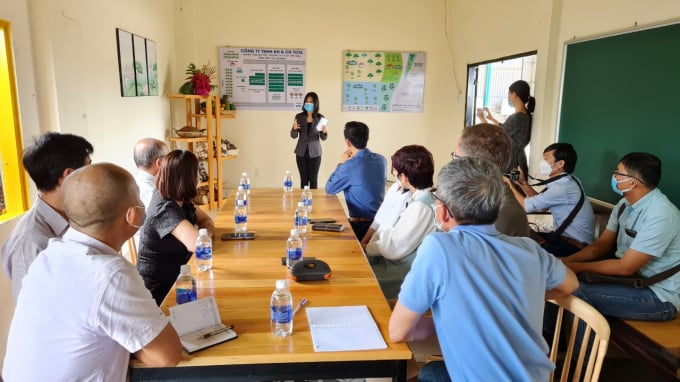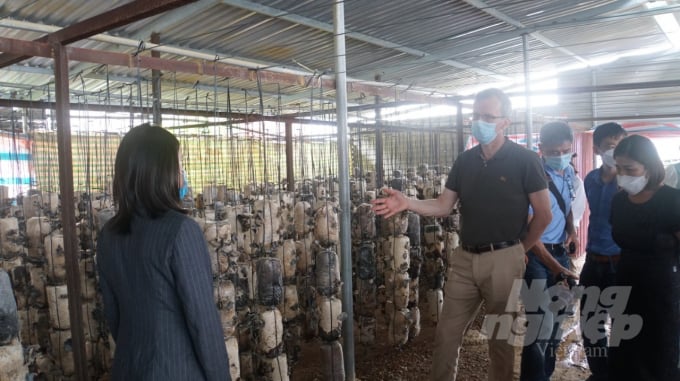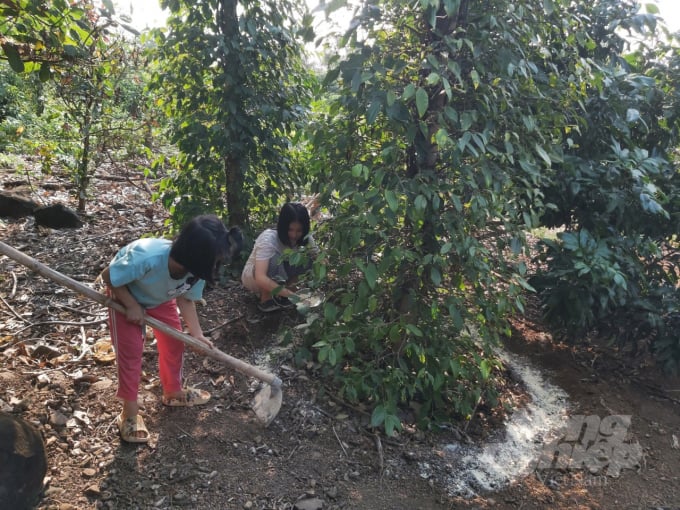June 6, 2025 | 11:40 GMT +7
June 6, 2025 | 11:40 GMT +7
Hotline: 0913.378.918
June 6, 2025 | 11:40 GMT +7
Hotline: 0913.378.918
And as a result, I went from one surprise to another. I saw Le Cam Ha, who is just over 14 years old, giving a presentation in English with a standard American accent with many international certificates in hand; Le Kim Ha, just 7 years old, made her own English dub clip, guiding activities for the little ones in the neighborhood.

Le Cam Ha, just over 14 years old, confidently presented the current and future activities of the farm to the Delegation of the European Union to Vietnam.
Le Ngoc Anh’s wife previously opened a preschool in Ho Chi Minh City, planning to start from there to create a primary school, secondary school, high school, and then vocational school, making a system with the desire to educate a person from childhood to adult with a career.
She approached many new educational methods in the world, but in Vietnam they were not accepted, so she decided to stop. When the eldest daughter Le Cam Ha was in 4th grade at an international school, the family decided to let her stop school and study with the homeschool method - an American curriculum with midterm and final exams.
This method was good in the sense that you could learn four basic subjects: Math, Natural science, Social science, and English, and then there were subjects you want to add such as a second foreign language, programming. One could shorten the learning time or learn all the subjects you like without interruption.
"Before going to that decision, I studied the results of families who were letting children study in this way and sat down with my kids to analyze the pros and cons of going to school and studying at home,” said Le Ngoc Anh’s wife.
Studying at home can allow learners to be proactive in time. They only need a fixed amount of time to study, and during their freetime learners can learn gifted subjects they like or learn life skills. But the disadvantage is that learners have to be disciplined, and in the first stage the parents have to accompany their children.
“I put this curriculum in high regard, but then realized that those programs did not determine how the child would use the learned knowledge growing up. It just simply acknowledges that the child has a certificate. I continued to learn that besides homeschool, there are also unschool (freelance learning, no degree required), lifeschool (learning from life), farmshool (the farm is the school).
“I once met a South African family who had traveled to many countries without money or possessions. They kept moving to new places. They just needed a place to eat, stay and work. They let their children study on the spot, move again when they don't like the place anymore. Their children had acquired a vast variety of knowledge, so they quickly became mature.
“After researching, my family chose unschool, which means learning what we need and want, without any program, without a degree. It's like eating a buffet. Le Cam Ha has been studying at home for 6 years, and Le Kim Ha, the younger sister, has been studying at home for nearly 2 years.”

The EU Delegation to Vietnam is asking Le Cam Ha about the farm's mushroom production.
If there was a description of this special "school", it would be: “My school has only two students which are us sisters. My father is the principal My mother is the vice principal. My house is the school. And sometimes dogs and cats would come in and lie down next to the desk."
Le Ngoc Anh’s wife said it was not entirely the case. The father would teach finance to the eldest daughter, and the mother would teach the housework, sewing, cooking, and taking care of their own health. The eldest daughter would teach her parents things she knows better such as technology and English. Everyone was a student, and everyone was a teacher, as long as they were well-versed in something.
The basic of the family was to do everything together, go everywhere together, and even study together. Le Ngoc Anh mainly took care of mushroom production and tree care, and when his wife would join him if she did not have to teach the children. The sisters' class schedule had a fixed time, usually 3-4 hours/day for subjects such as piano, yoga, or English, and the rest of the time they could receive teachings from the parents or teachers that were invited to come and teach.
“The results of my two children's homeschooling are beyond excellence. Compared with their peers, my children are much better in survival skills. When parents are not at home, they can cook their favorite dishes based on available food sources.
We utilize a circular agricultural production model, so when there are foreign projects or European climate change competitions, our children would participate and receive training together. The children would learn all about starting a business, how to sell products to the market, how to survey the market, how to calculate costs, and how to make profits.
Participating in a few projects like this every year, their knowledge after 3 - 5 years until the age of 18 would turn them into very good managers and business owners. The ultimate goal of human beings at birth is to study, work, be happy, live with what they like instead of following a certain pattern. Our generation has to go to university and get a degree in search of a stable. But such stability is actually unstable because if one day at work people told you to stop, then everything would become chaotic,” said Le Ngoc Anh.
The confidence and agility of Le Cam Ha (sister) and Le Kim Ha (younger sister) are indeed different. Even the older child's systematic thinking has surpassed Le Ngoc Anh. He often teaches Cam Ha personal finance and corporate finance. “When we were in Ho Chi Minh City, when she was only 11-12 years old, Cam Ha already learned how to manage family finances according to spending packages such as entertainment, living, studying, and charity. Now, when the parents are absent she can run the company normally, direct the workers, and pay the wages.”

The sisters fertilize the plants using soybean powder.
I asked Cam Ha, “Is studying at home more fun or boring than studying at school?” She then replied, “It actually depends on the period. At first I was bored because I was disoriented and I didn't have any friends. That process took a whole year, then my parents brought a group of their friends' children of the same age to study and play together. Until now, I prefer to study at home because my parents are like friends, and I can learn everything I like. While my friends have to go to school, I can learn, play, and explore things on my own. This additional time helps me further gain experience.”
“Unschool has this cool trait of being an educational product that is shaped who you are first, and then finds the way to help you reach your destination. The orientation we have for our children is the path of entrepreneurs and community activists, so they would learn anything related to these fields, otherwise we would skip it," said Le Ngoc Anh.
Translated by Samuel Pham

(VAN) Technology is redrawing the map of Vietnamese aquaculture: more modern, greener, and more sustainable.

(VAN) Novel process harnesses machine learning to reveal groups of genes that determine how efficiently plants use nitrogen.

(VAN) Several scientists and farmers are experimenting with soil treatment in some key durian-growing regions such as Cai Lay (Tien Giang), Dak Song, Gia Nghia, and Dak R’lap (Dak Nong).
/2025/05/25/4127-3-073637_820.jpg)
(VAN) Thanks to the promotion from an FAO-implemented project, vegetable production in greenhouses in Moc Chau has seen strong development, from 1.5 hectares in 2021 to nearly 50 hectares in 2024.

(VAN) FAO has recently supported USD 140,000 to implement the project 'Risk mitigation human-animal interface risks through disease control initiatives in pig farming.'

(VAN) The People's Committee of Tra Vinh province has approved an adjustment to the investment policy for the Green Hydrogen Plant project, increasing its area to approximately 52.76 hectares.
![Reducing emissions from rice fields: [2] Farmers’ commitment to the soil](https://t.ex-cdn.com/nongnghiepmoitruong.vn/608w/files/news/2025/05/05/dsc08881jpg-nongnghiep-140632.jpg)
(VAN) Clean rice cultivation model in Thuong Tan commune, Bac Tan Uyen district, is assisting local residents in achieving sustainable agriculture by substantially reducing costs, increasing productivity, and protecting the environment.